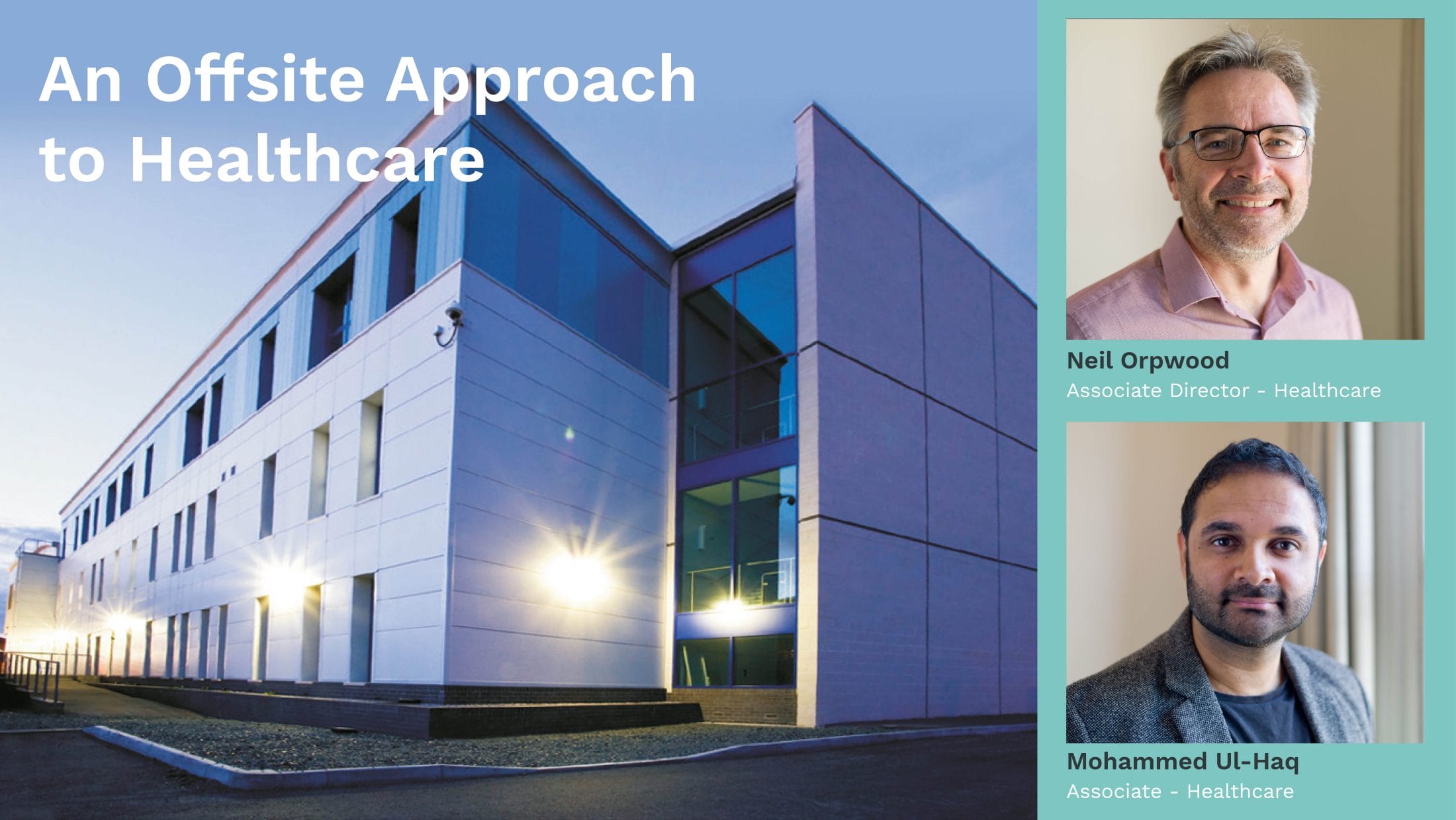
The UK government has endorsed the use of offsite manufacture in the delivery of Healthcare projects, with all new business cases required to target 70% Pre-Manufactured Value. At HLM Architects, we have long been advocates of offsite manufacture, but as arguably one of the most complex sectors to design, requiring intricate and unique spaces that cause minimal disturbance to live environments when in construction, how is this achievable?
The opportunities for utilising the variations of MMC and offsite manufacture are greater than they have ever been. We see the future as an opportunity to continue improving out skillset, mindset, and capabilities to provide efficient, sustainable buildings through new – and proven – methods of MMC and offsite manufacture.
Having established relationships with MMC manufacturers is one necessity to delivering successful offsite projects for the healthcare sector. Since the government’s endorsement, we have seen an increase in frameworks that have specified offsite construction, with the recently implemented NHS SBS Modular Buildings Framework, which covers NHS Trusts and Public Sector Organizations. This is both positive and exciting to see. Our past work over 17+ years we have developed ongoing relationships with numerous MMC manufacturers and been involved in the evolution of their systems and products – now, we are seeing the boundaries of MMC pushed further than ever before.
From our first project at Hull & York Medical School which ran between 2004 and 2007 which was delivered using a more basic, modular solution, to reusing existing volumetric units at Hull Royal Infirmary in 2009, we strive to be at the forefront of developments in the MMC and offsite arena.
More recently, we have started to investigate how we can adapt MMC/Offsite methods to more specialized builds. Using experienced gained across multiple sectors, including education as part of ongoing developments at Keele University, we worked with a modular contractor to design and deliver a new Diagnostic Imaging Suite for the School of Health and Rehabilitation. This small extension to an existing building used prefabricated modules, however these modules are lead-lined and heavily serviced to accommodate the installation and use of an x-ray machine. The use of modules for this type of building showcases progressive development, where they have historically been used for settings where minimal servicing and connectivity is required.
Further research being undertaken into the development of offsite construction in Healthcare is through the Construction Innovation Hub (CIH) platform design programme; a real-life, functioning, physical Research and Development project, aligned with a virtual model. This healthcare ‘sandpit’, where people can go and ‘play around’ with the components and potentials of the rooms, is focussed on developing an operating theatre-based cluster for minor procedures and isolation use. This will reduce the need for larger theatre use, and subsequently alleviate some of the strain on the NHS due to the number of people on waiting lists. Operating theatres are classically complex; the development of more basic spaces that are easily replicated and facilitate smaller procedures will free up these more complex spaces for larger operations – while increasing the number of more minor operations possible. The aim is to create a ‘kit of parts’, that will allow for the assembly of these within both new and existing buildings, improving the re-utilisation of existing healthcare facilities.
With the strain on the NHS front of mind, we are also developing an initiative for temporary accommodation that complements the NHS agenda and long-term plan. Primarily, we are considering temporary GP units that will be finished within factory conditions and linked up onsite. These units would be adaptable to other types of healthcare requirements, again assisting in the alleviation of waiting times. Working with a modular contractor who has built experience of delivering the first UK Passivhaus GP Surgery, we will be taking a major step closer to achieving the NHS’s Net Zero Carbon targets. This solution will be designed for replication across other sectors, including the well-established modular Education sector, where the base units will be very similar in terms of the connectivity required.
Healthcare is rich in sub-specialisms, and therefore standardization is more difficult. However, with the technology available to us, the opportunities for designing these buildings in new, adaptable ways, utilizing the variations of MMC and offsite manufacture are greater than they have ever been. We see the future as an opportunity to continue improving our skillset, mindset, and capabilities to provide efficient, sustainable buildings through new – and proven – methods of MMC and offsite manufacture.
Let’s educate, collaborate and be brave – Think: Offsite.



